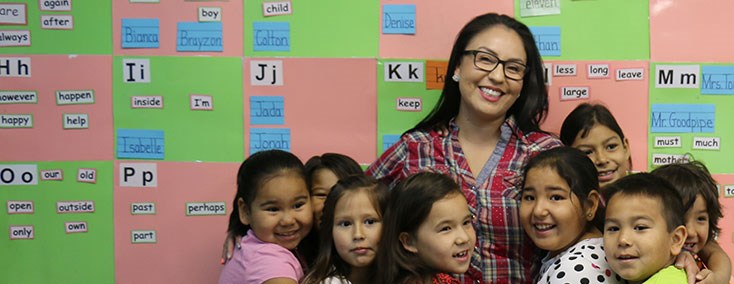Over the past five years, the Following Their Voices initiative has been successful in improving First Nations, Métis and Inuit student credit attainment and grad rates. The Government of Saskatchewan is encouraged by the positive results it is seeing at the 34 Saskatchewan schools that are participating in initiative.
Since FTV has been put into place in these classrooms, positive outcomes of the initiative include:
• a 20 per cent increase in credit attainment; and
• an 11.8 per cent increase in three-year graduation rates.
“It is great to see the positive impact Following Their Voices has had on the students of our province,” Deputy Premier and Education Minister Gordon Wyant said. “There are now more First Nations, Métis and Inuit students attaining more credits and graduating from high school than ever before.”
Following Their Voices offers support to teachers as they build strong and positive relationships with First Nations, Métis and Inuit students. This is achieved by changing student-teacher relationships and interactions, changing how teachers instruct and what the classroom or learning environment looks and feels like.
The initiative partners with provincial and First Nation schools to provide ongoing training and support to school-based teams and teachers. In addition, a broad representation of Saskatchewan First Nations and Métis Elders and Knowledge Keepers representing all the Indigenous language groups in the province provide ongoing engagement, advice and guidance.
Canoe Lake Miksiw School and Rossignol High School in Île-à-la-Crosse recently participated in a video highlighting the benefits of FTV in their schools and the positive impact it has had on staff, teachers and students. Watch the video here at https://youtu.be/MnNW-7Vyr-w.
Canoe Lake Miksiw School became an FTV school in 2017. Since then, Principal Arliss Coulineur has seen a noticeable change in teacher-student relationships and improved student participation and grades.
“I feel that I can best explain how the cultural responsiveness has changed with the implementation of Following Their Voices into the Canoe Lake Miksiw School,” Canoe Lake Miksiw School Principal Arliss Coulineur said. “By using nehiyawewin-Cree language terminology, the spirit of our language, you can gain a sense of the relationship that is gained between the student and teacher.
“First word is tipeyimisowin: it means 'take charge of it'. Taking charge of oneself. Helping a student to manage oneself to the point that they can take charge of themselves and become an independent learner.
“Second word is kakehtawisowin: this refers to being like a wise old person. Teachers recognize that students are intelligent beings. The teacher brings out the strengths in their students by recognizing how each individual student learns and employs a variety of teaching practices to do so.
“Moving forward, this program has enabled the relationships between the students and our educators to begin, generate, and flourish. Following Their Voices will always be a part of the culture of the Canoe Lake Miksiw School.”
Over the past five years, the FTV initiative has involved:
• 39 schools, including 26 provincial schools, 12 First Nation schools and one joint provincial and federal school;
• more than 1,000 participants, including 870 teachers and more than 130 school administrators; and
• approximately 36,000 students, with 14,000 self-declaring as First Nations, Métis or Inuit.
The Government of Saskatchewan has contributed $8.65 million to Following Their Voices since 2014. In 2017, Indigenous Services Canada (ISC) committed $3.32 million to this initiative in a three-year funding agreement. ISC staff members have also provided support to the initiative.



